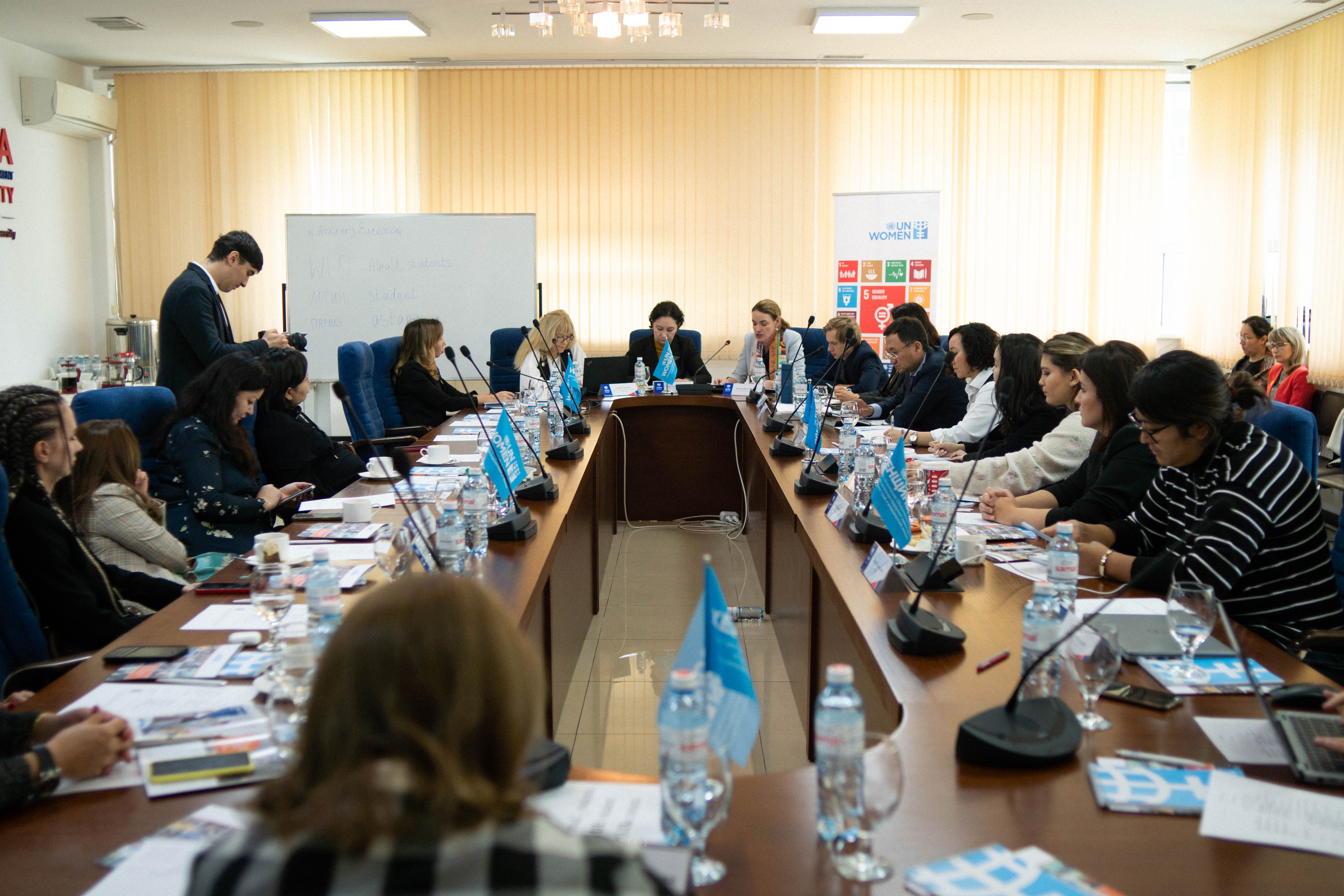WEPs Talks share corporate best practices on women’s empowerment in Kazakhstan
Date:

At a networking event in Almaty on November 4, organized by UN Women Kazakhstan in partnership with the AlmaU University, representatives of the private sector shared national and global best practices on promoting gender equality and women’s empowerment in business and adhering to the Women’s Empowerment Principles (WEPs).
More than 7,000 companies have become WEPs signatories globally, and 44 of them are Kazakhstani companies – making the country a leader in Central Asia.
Speaking at the WEPs Talks event was Gulshara Abdykalikova, a business partner of KazMunayGas, the former Secretary of State of Kazakhstan and the Chair of the National Commission for Women, Family and Demographic Policy under the Presidency, as well as the only female akim (governor) of the region in her time. KazMunayGas is today the largest national oil and gas company, with net revenues of KZT 1.197 billion (USD 2.6 billion). Along with 11 another companies, KazMunayGas is a part of a public holding Samruk-Kazyna, in which 80 women employees are undergoing training for further promotion to top management positions.
In April 2022, the public holding Baiterek signed onto the WEPs.
“We stand for equal opportunities and have no tolerance for any discrimination against our employees, including on the basis of gender,” stressed Adil Mukhamedjanov, Deputy Chairman of Baiterek, speaking at the WEPs Talks event. He noted that women constitute 20 per cent of the Board of Directors and 13 per cent of the Management Board of the holding and its subsidiaries.
Among Schneider Electric’s Kazakhstan operations, the number of women employees has almost doubled in the past seven years, reaching 50 people – one third of the company’s staff across the country.
“Our goal is to bring that number up to 50 per cent,” said Olga Marakushina, Human Resources Business Partner for the company in Central Asia.
At AVON, breast exams and ultrasound diagnostics, as well as a Menopause Policy giving an opportunity to adjust offices and working spaces to women’s specific physiological needs, and other initiatives have been specifically created for women employees.the According to Assel Sadykulova, General Director of AVON Kazakhstan, 52 per cent of the company’s leadership team, globally and in Kazakhstan, are women. This year, AVON in partnership with UN Women Kazakhstan, will distribute leaflets for domestic violence survivors across the country and provide prizes for winners of a social media contest among universities, as part of the 16 Days of Activism against Gender-Based Violence campaign in Kazakhstan.
Last year, Kazakhstan updated its Family and Gender Policy, and one of the objectives became raising women’s participation at the decision-making level, including the quasi-state sector, to 30 per cent by 2030. These positive changes are the result of joint efforts by the National Commission for Women, Family and Demographic Policy under the Presidency, the Ministry of Labour and Social Protection, and the Ministry of Information and Social Development, together with civil society organizations, all supported by UN Women.
Since the beginning of this year, more than 8,000 Kazakhstani women have reached Centres for Women’s Entrepreneurship Development (CWED), and half of them have been trained to develop their own business. The first centre opened last year in Turkestan city. There are now already 17 of them across Kazakhstan.
“Nineteen per cent of our women applicants live in rural areas. Women from socially vulnerable categories make up 30 per cent of our service recipients, and a majority of them are mothers with many children,” said Nazira Dzhakipbayeva, Head of the CWEDs operated by the Atameken National Chamber of Entrepreneurs.
Maria Dotsenko, UN Women Representative to Kazakhstan, concluded the event by saying: “Enthusiasm and a spirit of cooperation is what we feel today, and it is very inspiring. One of the WEPs Talks results is that participants agreed on creating a digital joint platform for further cooperation. Today, we witnessed a successful exchange of best practices and some companies have already updated their development plans.”